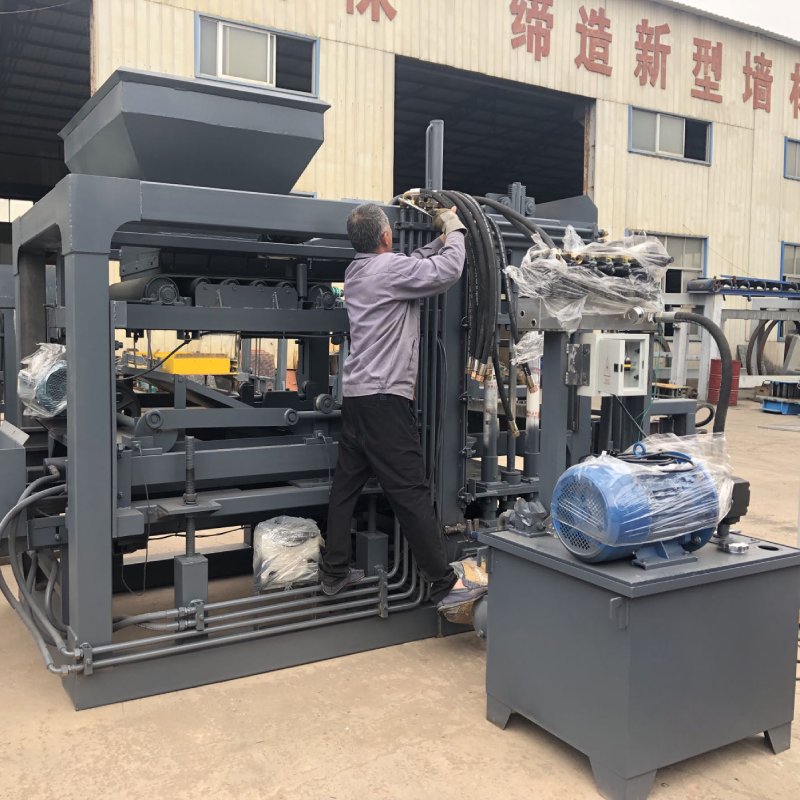
Image source Aiwei block machine
Integration of Artificial Intelligence (AI) in Brick Machine Manufacturing
Introduction
Artificial Intelligence (AI) has revolutionized numerous industries, and the world of brick machine manufacturing is no exception. The integration of AI technology in brick machine manufacturing processes has brought forth significant advancements, enhancing efficiency, optimizing material usage, and improving quality control. This article explores the integration of AI in brick machine manufacturing, its benefits, and the transformative impact it has on the industry.
. Understanding AI in Brick Machine Manufacturing
Artificial Intelligence in brick machine manufacturing involves the utilization of intelligent algorithms, machine learning, and computer vision to automate and optimize various aspects of the production process. AI-powered systems are capable of analyzing data, making informed decisions, and performing tasks that traditionally required human intervention. These systems are trained on large datasets and learn from patterns and past experiences to continually improve their performance.
Key Applications of AI in Brick Machine Manufacturing
The integration of AI in brick machine manufacturing offers a wide range of applications that enhance efficiency, productivity, and quality control. Let’s explore some of the key areas where AI is making a significant impact:
- Predictive Maintenance: AI algorithms can analyze real-time data from sensors and machine components to predict maintenance needs and potential failures. By identifying issues before they occur, brick machine manufacturers can proactively schedule maintenance, minimize downtime, and optimize machine performance.
- Material Optimization: AI algorithms can analyze various parameters such as material composition, moisture content, and curing conditions to optimize the mixture and reduce waste. By accurately predicting the optimal mixture ratios, brick machine manufacturers can minimize material costs while maintaining consistent quality.
- Quality Control and Defect Detection: AI-powered computer vision systems can analyze images of bricks or blocks to identify defects, such as cracks, deformities, or color variations. This enables real-time quality control, ensuring that only high-quality products reach the market and reducing the need for manual inspection.
- Process Automation: AI technology can automate various processes within brick machine manufacturing, such as material feeding, compaction, and curing. By automating repetitive and time-consuming tasks, manufacturers can enhance productivity, reduce labor costs, and improve overall efficiency.
- Intelligent Production Planning: AI algorithms can analyze historical data, market trends, and project requirements to optimize production planning. By considering factors such as demand, supply chain constraints, and resource availability, manufacturers can efficiently allocate resources, minimize inventory, and meet customer demands effectively.
- Real-time Monitoring and Optimization: AI-powered systems can monitor various parameters during the production process, such as temperature, pressure, and vibration. By analyzing this real-time data, manufacturers can optimize machine settings, ensure consistent product quality, and identify opportunities for process improvement.
Benefits and Transformative Impact
The integration of AI in brick machine manufacturing brings numerous benefits and has a transformative impact on the industry. Let’s explore the key advantages:
- Enhanced Efficiency and Productivity: AI-powered systems optimize production processes, reduce human intervention, and enhance overall efficiency. By automating tasks, minimizing downtime, and optimizing material usage, manufacturers can significantly improve productivity and meet production targets more effectively.
- Improved Quality Control: AI-powered computer vision systems enable real-time defect detection, ensuring that only high-quality bricks or blocks are produced. This leads to improved customer satisfaction, reduced waste, and lower rejection rates, enhancing the reputation of brick machine manufacturers.
- Cost Savings: AI integration allows for precise material optimization, reducing material waste and associated costs. Predictive maintenance and real-time monitoring also minimize machine breakdowns and production disruptions, leading to cost savings in maintenance and repair expenses.
- Enhanced Safety: AI-powered systems can monitor machine performance, identify potential safety hazards, and trigger alerts or shutdowns when necessary. This improves the overall safety of the manufacturing process, protecting workers and minimizing the risk of accidents.
- Data-Driven Decision Making: AI algorithms analyze large datasets and provide valuable insights for decision making. By leveraging data, manufacturers can make informed decisions regarding production planning, process optimization, and resource allocation, leading to better business outcomes.
- Innovation and Competitiveness: Embracing AI in brick machine manufacturing positions manufacturers at the forefront of technological innovation. By adopting AI-driven solutions, companies can differentiate themselves in the market, attract more customers, and gain a competitive edge over traditional manufacturing approaches.
Conclusion
The integration of Artificial Intelligence (AI) in brick machine manufacturing brings forth a new era of efficiency, quality control, and innovation. AI-powered systems optimize various aspects of the production process, including predictive maintenance, material optimization, quality control, and process automation. The benefits of AI integration in brick machine manufacturing are extensive, including enhanced efficiency, improved quality control, cost savings, and data-driven decision-making.
As the industry continues to evolve, the integration of AI technology will play a pivotal role in shaping the future of brick machine manufacturing. Manufacturers that embrace AI-driven solutions can stay ahead of the competition, meet customer demands effectively, and build a more efficient and sustainable future for the industry.
